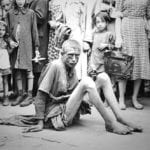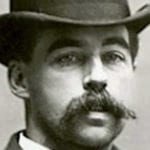 Movies and TV
Movies and TV  Movies and TV
Movies and TV  Humans
Humans 10 Times Scientists Were Absolutely Sure… and Absolutely Wrong
 Our World
Our World 10 Pivotal Moments for Life on Earth
 Movies and TV
Movies and TV 10 Most Realistic Medical TV Shows of All Time
 Creepy
Creepy 10 Eerie & Mysterious Ghosts of the Pacific Coast
 Weird Stuff
Weird Stuff 10 Typos That Accidentally Changed History
 History
History 10 Times Trickery Won Battles
 Technology
Technology 10 Awesome Upgrades to Common Household Items
 Misconceptions
Misconceptions 10 Hilarious (and Totally Wrong) Misconceptions About Childbirth
 Weird Stuff
Weird Stuff 10 Warning Labels That Exist Because Someone Actually Tried It
 Movies and TV
Movies and TV 10 Zombie Movies That Will Actually Terrify You
 Humans
Humans 10 Times Scientists Were Absolutely Sure… and Absolutely Wrong
 Our World
Our World 10 Pivotal Moments for Life on Earth
Who's Behind Listverse?

Jamie Frater
Head Editor
Jamie founded Listverse due to an insatiable desire to share fascinating, obscure, and bizarre facts. He has been a guest speaker on numerous national radio and television stations and is a five time published author.
More About Us Movies and TV
Movies and TV 10 Most Realistic Medical TV Shows of All Time
 Creepy
Creepy 10 Eerie & Mysterious Ghosts of the Pacific Coast
 Weird Stuff
Weird Stuff 10 Typos That Accidentally Changed History
 History
History 10 Times Trickery Won Battles
 Technology
Technology 10 Awesome Upgrades to Common Household Items
 Misconceptions
Misconceptions 10 Hilarious (and Totally Wrong) Misconceptions About Childbirth
 Weird Stuff
Weird Stuff 10 Warning Labels That Exist Because Someone Actually Tried It
Top 10 Heartbreaking Stories About Killers On Death Row
It’s easy to be callous about a murderer on death row. It gets harder, though, when you watch every step they take toward the execution chamber. For all the horrors these people have brought into the world, they’re still human beings, afraid to die—even if they deserve it.
Sometimes, the final moments of a killer can reveal all the horrors that made them the monsters they became, and sometimes, even a death deserved can be nothing short of heartbreaking.
10 Joe Arridy
The Happiest Prisoner On Death Row
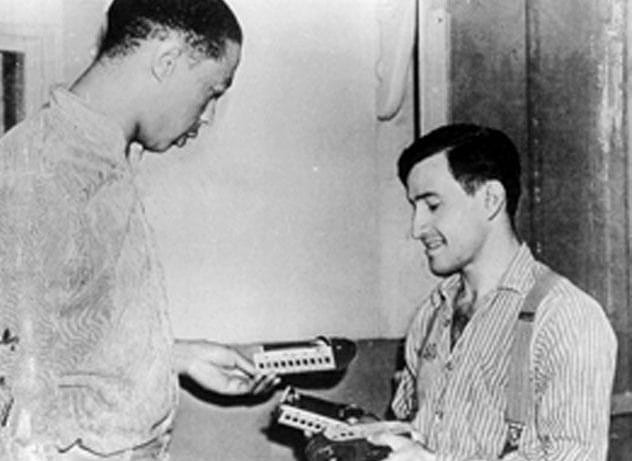
Joe Arridy (pictured right above) was called “the happiest prisoner on death row.” He had the mental capacity of a six-year-old, and although he’d been told he was going to die for confessing to killing a 15-year-old girl (who was actually murdered by a man named Frank Aguilar), he never seemed to fully understand.[1]
Arridy passed the time waiting for his execution playing with children’s toys. His favorite was a toy train the warden had given him, and he didn’t understand that, where he was going, he wouldn’t be able to take it with him.
He made that clear when the man in the cell next to him, Angelo Agnes, asked him, “When you go, Joe, you’ll give me your train, won’t you?” Joe Arridy shook his head. “No,” he told his cellmate. “I take my train with me.”
He changed his mind a little later, after the warden let him go into Agnes’s cell and play trains with him. The childlike Arridy was touched by the playdate. When it was over, he promised, “If I go, yes, I give my train to Agnes.”
But he still didn’t understand what was coming. Up until the very end, Joe insisted everyone else was just confused. When his mother hugged him one last time, he just stared at her blankly. He couldn’t understand why she was so upset.
As the guards led him to the gas chamber, Arridy still didn’t seem to fully understand what was coming.
9 George Stinney Jr.
The Youngest Boy On The Electric Chair
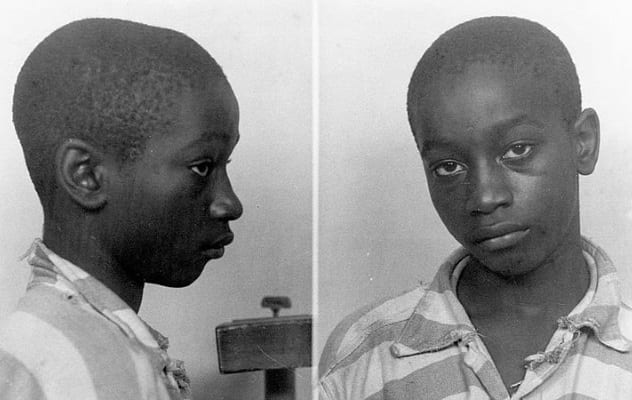
The police department in Columbia, South Carolina, had to deal with a difficult call one day in 1944. Two young girls, one 11 and the other only eight, had been found dead in a ditch, beaten to death with an iron pipe while they were picking wildflowers. Now they were getting a call from an old woman whose 14-year-old grandson had just told her that he was the one who did it.[2]
That boy’s name was George Stinney Jr., and when he came in, he directed them to the murder weapon. “I’m really sorry,” Stinney told the police. “I didn’t want to kill them girls.”
Stinney’s trial only lasted two hours, and today, some people insist he was framed. Either way, he was only 14 years old—the youngest American sentenced to death in the 20th century. After spending 81 days in a prison cell 80 kilometers (50 mi) out of town, chosen out of fear that the people would lynch the boy if they could find him, young George Stinney was taken to the electric chair.
The boy was so short that they had to sit him on a Bible to reach the headpiece, and the straps were too big to hold him in place. He convulsed violently while the electric shock entered his body. Before he died, his mask fell off, revealing his terrified, tearful face to the crowd.
Stinney was exonerated in 2014. It was concluded that his confession was coerced and that he was wrongfully convicted without a fair trial.
8 Christopher Newton
The Man Who Wanted To Die
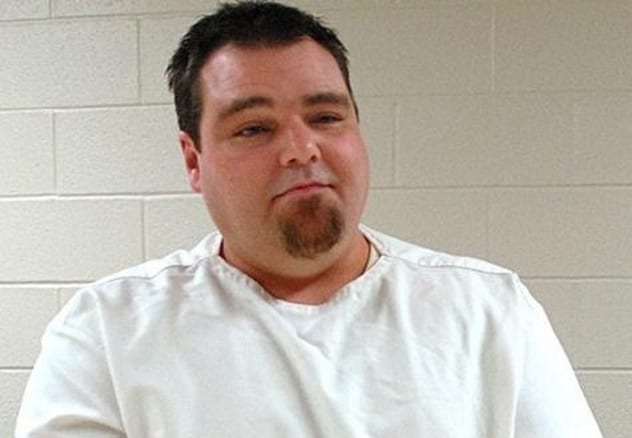
At 120 kilograms (265 lb), Christopher Newton weighed so much that his executioner couldn’t find a vein on his arms. He struggled for more than two hours trying to kill Newton—at one point even giving him a bathroom break while he tried to figure it out.
It was the longest lethal injection in history, and it had the most eager victim. Newton, after a hard and unhappy life, had deliberately gotten himself sent to prison by leaving a trail of evidence at the scene of his break-in.
Once there, he’d made it a point to get on death row. He killed a cellmate over nothing, slamming his head to the floor, stomping his throat, strangling him, and laughing while the officers pulled him away. When they interrogated him, he refused to answer any questions until they made one promise: that they’d give him the death penalty.[3]
When the moment came, Newton was almost happy. For his final statement, he joked that he could “sure go for some beef stew,” and he laughed while his executioner struggled to get the needle into his veins.
It took ten tries to kill Christopher Newton. Finally, after two hours, the executioner got the needle into his veins and sent poison rushing in to end his life.
7 Ricky Ray Rector
The Man Who Saved His Last Meal For Later
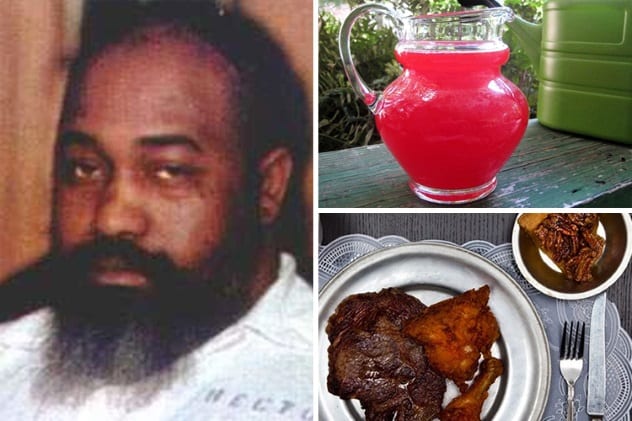
Ricky Ray Rector spent his life moving in and out of jail cells—until 1981, when he ensured he’d never move out of one again. He’d gotten into a fight over the three-dollar cover charge at a dance club, and the temperamental Ricky pulled out his gun and shot three people. One of his bullets took its target in the head.
Ricky ran for his life, but his family managed to convince him to turn himself in. He waited for the police to come and pick him up. Then, when they arrived, he put his gun to his head and pulled the trigger. The gunshot was supposed to kill him, but it didn’t work. Instead, Ricky lost about one-third of his brain. He effectively gave himself a lobotomy.
Ricky had the mind of a child after that. He would scream when lights went out, terrified of the dark. He would badger people with questions about dogs. He would hop on his bed, telling people he was hunting Indians, and would insist that the guards were letting live alligators into his cell.
When his last meal came, Ricky Ray Rector ordered steak, fried chicken, and pecan pie. He left the pie behind. He was saving it, he told the guard who carried him off to his execution, for later.[4]
6 Rudolph Tyner
The Man Who Was Killed On Death Row
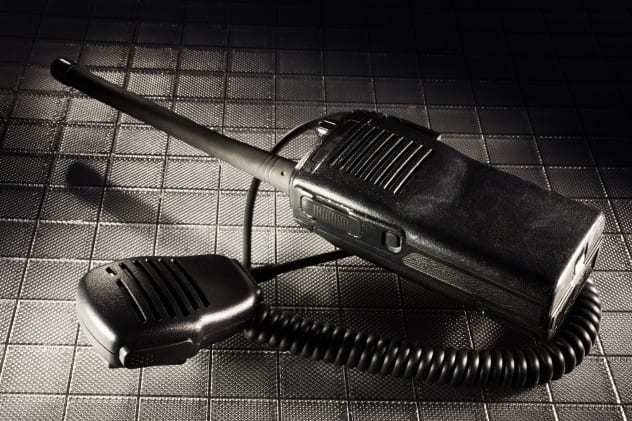
Rudolph Tyner found himself in a cell next to Donald Henry Gaskins, a man known as the “Meanest Man in America.” Gaskins was a serial killer who had killed 13 people, including a pregnant mother. Gaskins was a monster, but now that Tyner was on death row, Gaskins was the closest thing he had to a friend.
Tyner had earned his cell in a robbery gone wrong. At 18 years old, he’d tried to rob a grocery store run by an elderly couple. When the man, Bill Moon, refused to hand over the money, Tyner tried to scare him. “If I shot Moon in the arm,” Tyner later said he’d thought, “I would get some money.” He fired his warning shot—but accidentally killed Moon. When Moon’s wife started screaming, Tyner killed her, too.
Tyner was picked up later that night and confessed to what he’d done. Now he was on death row, next to a cold-blooded serial killer who was offering to be his friend. Unbeknownst to Tyner, Gaskins was plotting his death.
Gaskins gave Tyner a radio speaker that he said would let them talk between their cells. Tyner, unaware he was holding a plastic case full of C-4 explosive and desperate for someone to talk to, held it up to his ear. His new friend hit the trigger, the bomb exploded, and Tyner died a gruesome death.
Police later found out that Moon’s son had given Gaskins the explosives and paid him to kill Tyner. Gaskins, though, probably would have done it for free. He took pleasure in the story of how he’d killed Rudolph Tyner, telling people, “The last thing he heard was me laughing.”[5]
5 Randy Woolls
The Addict Who Helped His Executioner Find A Vein
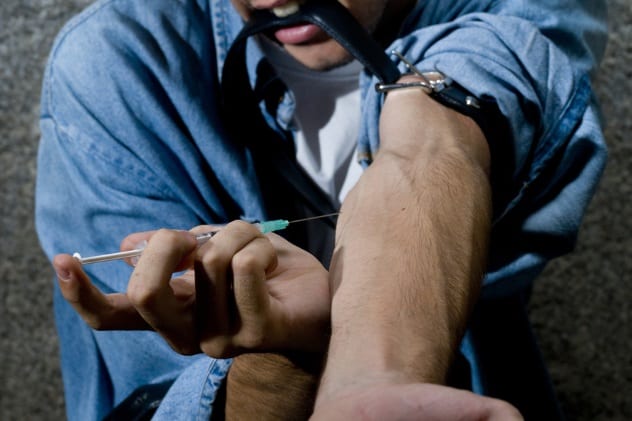
Randy Woolls had been a drug addict since he was 13 years old. He’d been injecting things into his veins his whole life—and he brought it to an end after filling them full of Valium.
While, in his words, “flipped out on drugs,” Woolls went to a drive-in movie theater and beat the ticket seller with a tire iron. Then he slit her throat, piled everything in her booth on top of her, and set it all on fire. When he was arrested, he had no memory of doing it and no idea why he’d done it, saying only, “I was out of my mind.”
That wasn’t enough of a defense, though, to keep him off of death row. He dedicated his last words to the woman he’d killed. “I’m sorry for the victim and family,” he said. “I wish there was something I could do to make it all right.”
After years of drug abuse, his veins were so collapsed that the technicians struggled to find a place they could inject him. The experienced Woolls, though, kindly gave them a hand. He helped them find a right place and helped them ease in the needle that ended his life.[6]
4 Mark Stroman
The Killer Whose Victim Tried To Save His Life
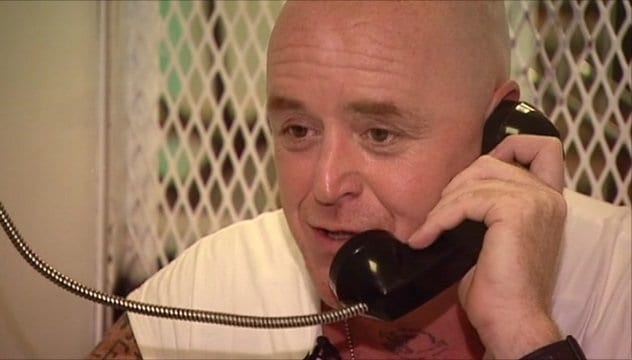
Mark Stroman was, by his own description, a white supremacist. After 9/11, he felt he had a patriotic duty to go on a killing spree, so he grabbed a gun and started calling himself the “Arab Slayer.”
He killed his first victim on September 15, 2001, shooting a Pakistani man in a grocery store. Then, six days later, he walked into a convenience store and shot Rais Bhuiyan, a Muslim from Bangladesh, with a shotgun.
Bhuiyan survived, and the police managed to capture Stroman—but not before he killed again. When he was arrested, he was unapologetic. He called himself a patriot and faced death row believing that he was a hero.
Rais Bhuiyan, however, wouldn’t let him die. His Muslim faith, he felt, required him to forgive Stroman and to do everything he could to save his life. So he started a petition and filed a lawsuit to try to get the man who’d shot him in the face with a shotgun off death row.
Stroman and Bhuiyan exchanged letters. Stroman, seeing that the man he’d tried to kill was attempting to save his life, said that because Bhuiyan had taught him not to hate, he was facing his death “more content than [he had] ever been.”
For all Bhuiyan’s efforts, he wasn’t able to save Stroman’s life.[7] For his last words, though, Stroman told the world what Bhuiyan had taught him: “Hate causes a lifetime of pain.”
3 Brandon Rhode
The Death Row Prisoner Who Wasn’t Allowed To Commit Suicide
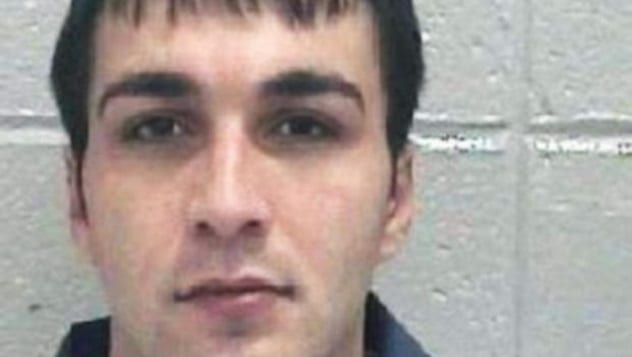
On the day he was scheduled to die, Brandon Joseph Rhode smuggled a razor blade into his cell. He wanted to decide how he ended his own life, he told a cellmate; he didn’t want to be “put down like a dog.”[8] And so, on the day he was to be executed, he hid under his blanket and slashed his arms and neck.
When the guards realized what was happening, they rushed to rescue him. He was already unconscious and bleeding out fast, but they rushed him to the hospital and patched him up. He’d suffered serious brain damage, but they were able to save his life. Within a week, he was healthy enough to move.
And so, one week after Rhode had tried to kill himself, the men who had refused to let him die pulled him into the execution chamber. Less than seven days before, they’d saved his life—all so that now, they could inject lethal drugs into his veins.
2 Philip Workman
The Man Who Gave His Last Meal To The Homeless
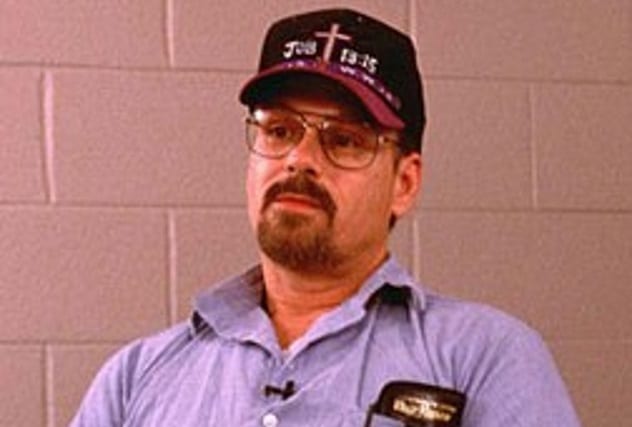
Philip Ray Workman was still holding up a Wendy’s restaurant when the police arrived. He tried to make a break for it, but a police officer named Ronald Oliver managed to tackle him. Workman, though, fought back. In the scuffle, he shot Oliver in the chest, killing an officer of the law.[9]
In a way, he’d killed himself, too. By killing a policeman, Workman had ensured his seat on death row, and there wasn’t much chance of him getting out. The only thing Workman could do was leave a small amount of good in the world before he died.
He asked the guards to give his last meal to a homeless person. He wanted a vegetarian pizza, he said, but he didn’t want it for himself. He wanted them to give it to someone who could really use it. The guards, though, refused. Workman wasn’t able to help anyone before he died alone.
When a woman named Donna Spangler heard the story, however, she insisted on making sure Workman got his redemption. She raised funds and donated 150 pizzas to a rescue mission on Workman’s behalf.
“Philip Workman was trying to do a good deed,” she believed, “and no one would help him.”
1 Ted Bundy
The Monster With A Mother
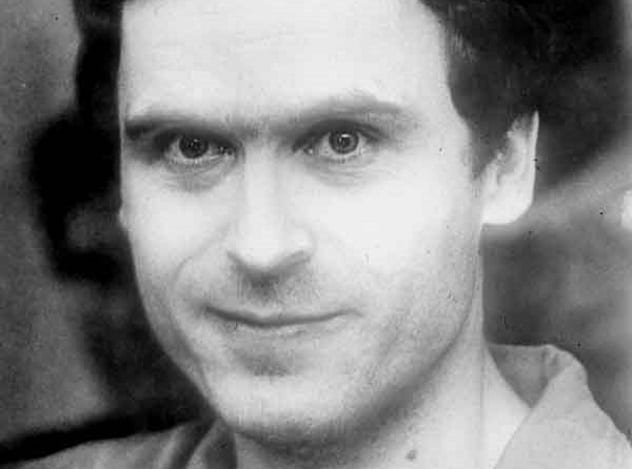
Ted Bundy’s name is synonymous with evil. He killed dozens of women, ultimately meeting his end after killing a 12-year-old child. No one in the world felt sorry when he died—except for his mother.
Bundy’s mother, Louise, was a churchgoing woman, and like any mother, she loved her son. She refused to believe that he’d done what everyone said, insisting that, “Ted Bundy does not go around killing women and little children!”[10]
After her son confessed, though, and mountains of evidence piled up against him, it became harder and harder for her to cling to the belief that her little boy was innocent. Still, she stood up for him until her last days, complaining now that people made him seem like more of a monster than he really was.
On the day of his execution, Ted Bundy’s mother called him twice. She got in her last few words with her son, the little boy who’d grown into one of the most infamous serial killers in the world. Then she called him again, determined to tell him one last thing.
They were the last words she would ever say to her little boy: “You’ll always be my precious son.”
Read more about the horrors of death row on 10 Horrifically Botched Executions and 10 Facts You Might Not Know About Death Row.



